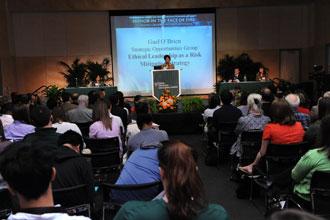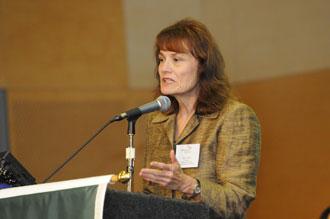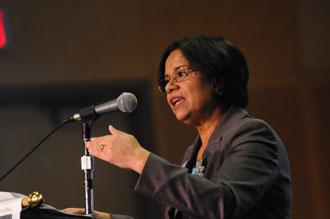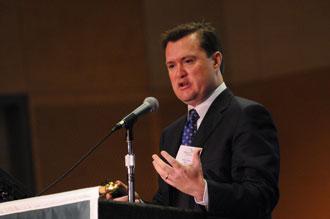Crisis experts tout importance of ethical leadership
Having a well-defined code of ethics may not prevent every crisis, but according to one of the speakers at this year’s Burkenroad Symposium on Business and Society, it helps prevent those crises that do occur from becoming worse.

“Ethical leadership is one of the ways of keeping problems problems before they become catastrophes,” said Gael O’Brien, principal of the consulting firm Strategic Opportunities Group and a columnist for Business Ethics magazine.
The importance of ethical leadership was a central theme of this year’s program, “Honor in the Face of Fire: Turning Crisis into Opportunity.” The symposium, an annual presentation of the Freeman School’s Burkenroad Institute, took place on Friday (Feb. 18) in the Lavin-Bernick Center.
In addition to O’Brien, this year’s presenters included Anjali Sheffrin, a research professor with the Tulane Energy Institute, and Robert Ulmer, a professor of speech communication at the University of Arkansas and an internationally recognized expert in crisis communications. Adrienne Colella, James McFarland Distinguished Chair in Business and director of the institute, moderated.
O’Brien said a common theme in many recent business crises—ranging from Countrywide Financial and Toyota to Massey Energy and BP—is self-deception on the part of company executives.

“Unethical behavior is really a result of other behaviors that blind us from seeing what is actually happening,” she said. “Self-deception allows us to distort reality so that we think what we’re doing is somehow justifiable.”
The solution, O’Brien suggested, is to foster a culture of two-way communication within organizations and to make values a fundamental part of corporate strategy.
“Ethical leadership does increase trust and avert crises,” she said. “Not standing for something means you don’t have a basis on which to make decisions.”
O’Brien cited FM Global, a Rhode Island-based insurance company, as a good example of ethical leadership in action. A core value of the company is the belief that all loss is preventable, and as an outgrowth of that belief, O’Brien said the company hires engineers to work with clients to reduce the risk of unnecessary losses.
“Ethical leadership is essentially about creating a win-win situation and ensuring that the organization you’ve been entrusted with is going to be able to survive,” she said.

Sheffrin, former chief economist for the California Independent System Operator, told the story of her experience as market monitor during the California energy crisis. It was Sheffrin who ultimately proved that companies like Enron were manipulating the wholesale electricity market to drive up prices at the expense of the public.
When it was first introduced, California’s electricity market was praised as a model of innovation that would rely on competition to drive down energy costs, but Sheffrin said none of the individuals involved in creating the system questioned some of the assumptions at its core.
“Always question the fundamental assumptions people are making,” Sheffrin said. “If people had questioned those assumptions, we might have prevented some of the damage.”
Ulmer closed out the symposium by emphasizing the importance of ethical communications during times of crisis. Too many companies don’t spend enough time developing and articulating organizational values, he said, which puts them at a disadvantage when a crisis occurs.

“Because we haven’t really thought about what our values are, we start thinking about things like reputation and image and this is going to be on the front page of the New York Times,” Ulmer said. “If you haven’t thought about how you would respond and how you would communicate in a situation, you’re more apt to have a maladaptive response.”
During times of crisis, Ulmer said organizations should remember to listen to stakeholders, avoid spin, focus on solutions rather than reputation, and—most importantly—always tell the truth.
“Lawsuits come back years and years later, and if you have to start to think, what did I say again, that’s where you start to look silly,” he said. “That’s why values are crucial to organizational responses.”
Interested in advancing your education and/or career? Learn more about Freeman’s wide range of graduate and undergraduate programs. Find the right program for you.
Other Related Articles
- Research Notes: Shuhua Sun
- Research Notes: Alissa Bilfield
- Quartz: Companies that replace workers with AI ‘risk mediocrity,’ expert warns
- BBC News: ChatGPT will soon allow erotica for verified adults, says OpenAI boss
- OHSonline: From the Battlefield to the Workplace - How Staff Rides Improve Safety Decision Making
- Jobs fuel growth of MME program
- Tulane Energy Institute gets major gift from Templeton family, new name for Trading Center
- Tulane launches technology ethics course bridging science, business and the humanities
